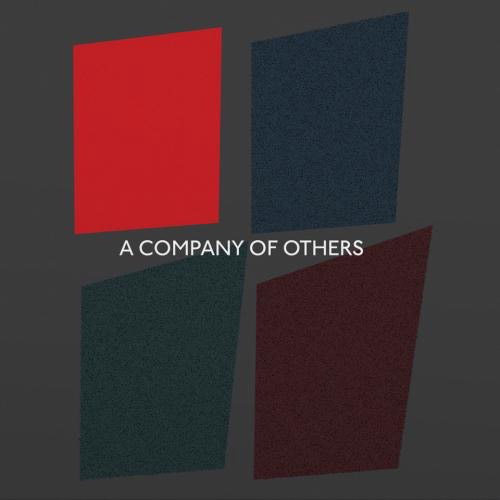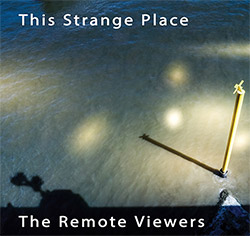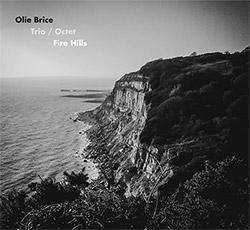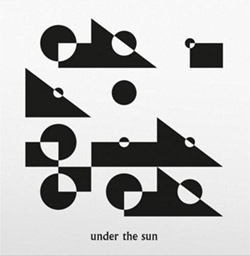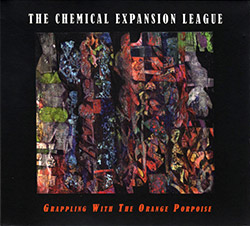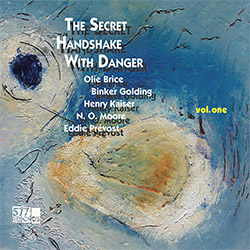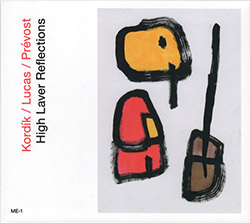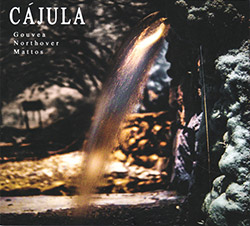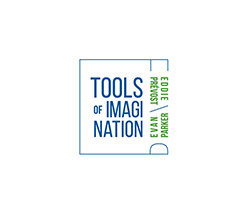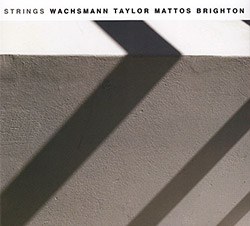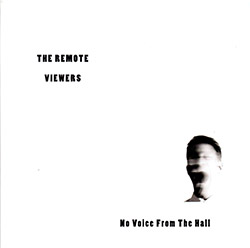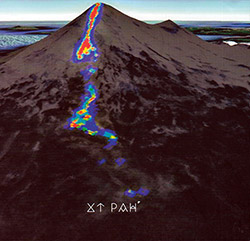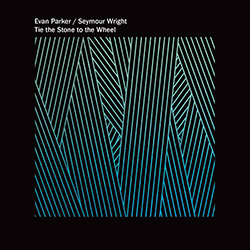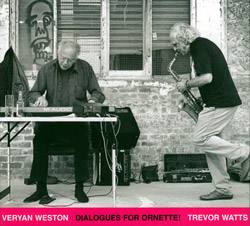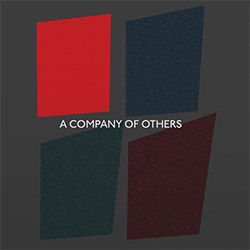
To celebrate drummer/percussionist Eddie Prévost's 80th birthday, Café Oto hosted four concerts once a week in June, 2022, each a differing configuration from Prévost's history; this first concert brings together Prévost with four horn players, NO Moore on guitar and Marcio Matttons on double bass, for varying duos, trios and full ensemble performances.
In Stock
Quantity in Basket: None
Log In to use our Wish List
Shipping Weight: 4.00 units
Sample The Album:
Jason Yarde-alto saxophone
Seymour Wright-alto saxophone
Alan Wilkinson-baritone saxophone
Harrison Smith-tenor saxophone
Sue Lynch-tenor saxophone
Tom Chant-tenor saxophone
Veryan Weston-piano
Marcio Mattos-bass
NO Moore-electric guitar
Eddie Prevost-drums
Click an artist name above to see in-stock items for that artist.
Includes a 16-page booklet with liner notes by Eddie Prévost, and b&w images of the performers.
UPC: 5020492010924
Label: Matchless
Catalog ID: MRCD109
Squidco Product Code: 33459
Format: CD
Condition: New
Released: 2023
Country: UK
Packaging: Cardboard Gatefold w/ booklet
Recorded at Cafe OTO, in London, UK, on July 9th, 2022, by Pedro Subtil.
"[...] As a whole, Prévost's Bright Nowhere traced a kind of cumulative trajectory, paradoxically, from energetic plenitude through to reduction, quietness, and farewell. Named for a previous Prévost project, Meetings with Remarkable Saxophonists, the first week was the most joyously explosive and excessive. Six different horn players came on stage in various combinations while a "house band" of Prévost, playing drumkit rather than his more usual percussion setup, bassist Marcio Mattos, pianist Veryan Weston, and guitarist N.O. Moore, functioned like a kind of free jazz version of — say — the Ronnie Scott's house band of the sixties in which musicians like Stan Tracey and Tony Oxley cut their musical teeth. In itself, that setup seemed a reference to historical forms, or formats — blowing sessions, house bands, and the like — but with an entirely different musical content. Moore produced squalls of feedback, Prévost splashed out polyrhythms, and the saxophonists generally came on playing fortissimo and stayed there. In the first half, they came out one by one, relay style, briefly playing duos before the next players came from the wings: among them, Jason Yarde, fleet and melodic; Seymour Wright, worrying, abrasively riff-like, at a handful of multiphonic notes; the excellent Sue Lynch, offering studies in breath and control. The first half was loud: the second half got even louder, as two trios and then a sextet — Yarde, Wright, Lynch, Harrison Smith (restlessly inquisitive), Alan Wilkinson (throatily raucous), and Tom Chant (jaggedly textured) — blew to Borbetomagus levels. Infectious, joyous, and delightfully unsubtle, it may have been the less "sophisticated" of the four concerts, but it was also in some ways the most purely enjoyable, and all the more welcome for being unexpected. [...]"-David Grundy, Point of Departure
"Eddie Prévost turned eighty in June 2022 and to celebrate, Café Oto invited Prévost to convene four separate concerts, held every Saturday of July. Prévost named the residency for a line from Seamus Heaney's "Clearances" — "its heft and hush become a bright nowhere" — which he took as a model for the kinds of utopia modelled in musical improvisation; the series was further dedicated to the late impresario Victor Schonfield, who died early in May. As curator of the Music Now charity in the '60s, Schonfield played a key role in bringing American jazz and free jazz musicians from Ornette Coleman and Sun Ra to Miles Davis to the UK. He also served as part-time manager for AMM, the group with which Prévost over the years has been most indelibly associated — to the extent that Schonfield was jokingly referred to as a member of the group. In the '70s and '80s, Schonfield was active in left politics as chief trade union organiser and treasurer of the Campaign for Labour Party Democracy: in his biography of Michael Foot, Mervyn Jones writes of Schonfield, Vladimir Derer and Jon Lansmann, later founder of Momentum, "they were unreservedly dedicated, they had no political ambitions of their own and they were in a position to work day and night for the cause without pay." And though, during this time, Schonfield's activities as a promoter had taken a back seat, in later years, he was a regular at Oto and a mentor to younger musicians.
The dedication to Schonfield highlighted the importance of those who, though not themselves musicians, are indispensable in facilitating and enabling the music and the culture it creates. It also harked back to that moment in the mid-'60s of a counter-cultural London, where musicians of working-class backgrounds like Prévost and Keith Rowe were able to some sort of lead in reinventing what music might be, even as that music has tended to fly under the radar of national and international cultural institutions. All those decades on, the series, with Prévost himself in the role of curator and organiser that Schonfield occupied, manifested a continuing dedication to improvised music as collective, social endeavour. Its generational sweep reflected the various stages and facets of Prévost's career and his firmly collaborative ethos, both centring and moving beyond his own individual role. As a music that is about collaboration, removing the format of the solo for an entirely collective music, free improvisation does not naturally lend itself to narratives of heroic, solitary genius, though sometimes those narratives inflect the way its history has been passed down to us. For Prévost, however, the approach to — or enabled by — improvisation, first discovered in AMM, and later expanded in his various theoretical books on improvisation, insists on the collective dimension first and foremost. As he wrote in the liner notes for the CD reissue of AMMMusic, "A preoccupation with ... with one's own ego at the expense of the ensemble is destructive."
Over the course of Bright Nowhere, watching each event unfold in its difference was watching process at work: not just a historical assembly, a chronological survey, or a potpourri, but a manifestation of the simultaneous openness and focus that can still be found in freely improvised music nearly sixty years since Prévost first began playing it. The figure of travel that Prévost added to Heaney's phrase — "marking a journey to a bright nowhere" — might suggest progression towards a goal, but-as in the fascination with notions of wandering, errancy, and travelling in Luigi Nono's late work — it instead complicates these ideas, blurring borders and boundaries, while refusing to give up on the hopes for better — political, social, human — brought to bear on aesthetic experimentation."-David Grundy, Point of Departure
Includes a 16-page booklet with liner notes by Eddie Prévost, and b&w images of the performers.

The Squid's Ear!
Get additional information at Point of Departure
Artist Biographies
• Show Bio for Jason Yarde "Composer, arranger, producer, musical director and saxophonist Jason Yarde writes music that has been described as powerful, spiritual, evocative, rhapsodic, hair-raising and formidable. Jason began playing alto and soprano saxophones with Jazz Warriors while still a teenager and then went on to MD this landmark orchestra, becoming one of its principal writers. He has a BA (Hons) in Performance Arts from Middlesex University - a degree that incorporated a year at William Paterson Collage in New Jersey where he studied orchestration, studio engineering, jazz performance and saxophone. As well as composing for his own performance projects, Jason has written for dance, music theatre, opera and TV. He is also a brilliant musical director, and his highly distinctive arranging style reflects the numerous artists and ensembles he has worked with. In addition to composing, arranging and performing, Jason Yarde has enjoyed much success as a record producer. He has recently completed the debut CD by rising star UK jazz pianist Gwilym Simcock and he is one of the foremost producers at UK independent Jazz label Dune Records. " ^ Hide Bio for Jason Yarde • Show Bio for Seymour Wright "Seymour Wright - saxophonist, investigator, artist - lives in London. His practice is about the saxophone - music, history and technique - actual and potential; an on-going, rigorous and exhaustive exploration of the instrument. The energy of this learning is applied to various collaborations and contexts to access/share what he has called the 'awkward wealth of investigation'. His work is documented on two widely acclaimed self-released collections Seymour Wright of Derby (2008) and Seymour Writes Back (2015). As well as STEPS, his current collaborations include lll人 (with Daichi Yoshikawa and Paul Abbott), GUO (with Daniel Blumberg) and XT (with Paul Abbott)." ^ Hide Bio for Seymour Wright • Show Bio for Alan Wilkinson "Born Ilford,East London, 22 August 1955; soprano, alto and baritone saxophones, voice. After a short period in Manchester, deciding that the possibilit of a career in librarianship was not for him, Alan Wilkinson moved to Leeds in 1975 to undertake a Fine Arts degree, concentrating on painting. Shortly after completing his degree he began playing the alto saxophone and joined the group Crow with Mathew Coe (aka Xero Slingsby), Richard Ward, and long-time associate, drummer Paul Hession. Following a short tour of Belgium and Holland, he decided to quit painting and concentrate on the saxophone. In 1979 he formed the group Art, Bart & Fargo with Hession and tenor sax player Pete Malham,experimenting with playing a wide range of other instruments, mainly percussion, and mixing composition with pure improvisation. After playing in England, Belgium and Germany the trio disbanded after three years. In 1982 Wilkinson attended the Improvised Music Summer School in South Wales and this introduced him to musicians such as Peter Brötzmann, Barry Guy, Fred Van Hove, Keith Tippett, Phil Wachsmann and Radu Malfatti among others. This led directly to gigs on the London improvised music scene, a trio with Paul Hession and Japanese pianist Akemi Kuniyoshi, and many gigs with drummer Steve Hubback in a wide variety of combinations. In 1983, in duo with Hession, he appeared at the 10th annual Free Music festival in Antwerp, Belgium and at the Holland Art Initiative in Eindhoven. The same year he was among the original organisers of the Termite Club in Leeds, specialising in improvised and experimental music and performing arts. A trio with Steve Noble and Tony Moore existed from 1985 to 1988, having toured in Britain, Belgium, Holland and Denmark and in 1985 Wilkinson also joined the large improvising ensemble The Ubiquity Orchestra. From 1987 to 1989 Wilkinson's activities included a widely toured quartet with Willi Kellers, Christoph Winckel and Alex Maguire (through to 1992); a tour of England and Wales with Phil Durrant, Thebe Lipere, Will Evans, Louis Moholo and Keith Tippett; gigs with Mick Beck's large group Feet Packets; and a tour of England with Alex Maguire's nine-piece Cat o'Nine Tails. Alan Wilkinson has been invited to play in Derek Bailey's Company on a number of occasions, firstly in 1987 on a tour of Switzerland and Italy with Steve Noble, Barre Phillips and Ernst Reijseger; again in 1988 at the ICA in London in a Company Week which included Dennis Palmer, LaDonna Smith, Gregg Bendian and Milo Fine; and in 1993 he helped organise and participated in Company Week at the Place Theatre with, among others, Don Byron, Robyn Schulkowski, Ikue Mori and Phil Minton. Other associations have included a stint with the John Law Quartet; playing with the London group Ya Basta; Real Time, with artist Gina Southgate and drummer Mark Sanders joined occasionally by Maggie Nicols or Susanna Ferrar. He has also played solo gigs since 1991. Alan Wilkinson is probably best known as a member of the take no prisoners Hession/ Wilkinson/Fell trio formed with the addition of Simon Fell to the longstanding duo in 1989. Though perhaps correctly typified as a high energy power trio - starting loud and then opening the throttles - and the recorded evidence goes some way to support this proposition, there are not only areas of respite in the playing but also an interest in fitting the group into new situations. For example, in 1996 a short UK tour took place in June with US guitarist Joe Morris (with a CD forthcoming on Incus); and in November the trio appeared in an incendiary, ear-numbing, exhausting and hugely enjoyable interchange with Derek Bailey at the annual Termite Festival in Leeds: a gig that the organiser's attempted unsuccessfully and on several occasions to end prematurely (this being Sunday night in a pub in the UK), finally resorting to flashing the room lights and talking loudly; Derek Bailey, having been sat head down in concentration for the uninterrupted 40 minutes of the second piece then looking up blinking, seemingly surprised at the near panic. The following night, Wilkinson and Fell undertook a four date tour of the UK with a quartet completed by Peter Brötzmann and Willi Kellers, reprising a similar tour by the same musicians in 1994." ^ Hide Bio for Alan Wilkinson • Show Bio for Harrison Smith "Harrison Smith had saxophone lessons from the age of 13, and clarinet lessons from the age of 14. His first playing experience was with Herrington Colliery Band and later with various dance bands and rock/soul groups in the North East of England. Smith became interested in jazz and started to play with local groups lead by Alex Hand and Alan Glen. In 1973 he attended a jazz course at Barry Summer School (Wales) and some months later he was asked by one of the tutors, Barry Guy, to do a national tour with the "London Jazz Composers Orchestra". The same year he moved to London. In London he joined John Walters` `Landscape` and also gained valuable musical experience by playing with likes of Mike Osborne, Harry Beckett, Louis Moholo, Harry Miller, Evan Parker, Elton Dean etc. Over the next few years he worked with various groups lead by Dave Defries, Jim Dvorak's `Sun Sum` and `Dhyana` (album to be released in the near future), Rodger Dean's `Lysis` with Kenny Wheeler, the `Michael Garrick Sextet`, Keith Bailey's `Prana` with Chris McGregor and Kent Carter, a duo with Keith Bailey and `Jazz Africa`. In 1983 he joined the very popular South African inspired group `District Six`, recording four albums, playing festivals and touring in Germany, Italy, Switzerland, the Czech Republic etc, as well as Britain. Harrison played with District Six for some 8 years. In 1988 the `Free Jazz Quartet` was formed with Eddie Prevost, Paul Rutherford and Tony Moore, recording the much acclaimed "Premonitions" album and toured in both Spain and the U.K. In the nineties Smith worked in a varied mix of projects including Danny Thompson/ Richard Thompson's `What Ever Next` , Joe Gallivan Trio, Louis Moholo Group, a duo with Eddie Prevost, co-led `Ala-Ka-Zam` with Jim Dvorak, `Continuum` a classical orientated ensemble and performed solo. Harrison put his own group together in 1998... the `Harrison Smith Quartet` with Liam Noble, piano, Jeremy Brown, bass and Winston Clifford on drums. They recorded their first album the same year `Outside Inside` for the Slam label which received critical acclaim internationally. Since then he has worked with `London Improvisers Orchestra`, the `Dill Katz Quartet` and has performed across a wide spectrum of the music, from jazz standards to the cutting edge and more experimental." ^ Hide Bio for Harrison Smith • Show Bio for Sue Lynch "Sue Lynch runs 'The Horse Improvised Music Club' with Adam Bohman and Hutch Demouilpied. www.horseimprovclub.wordpress.com/.Since 2014, The horse has been based at IKLECTIK Art Lab, so this and other projects have been in conjunction with Eduard Solaz. Lynch is currently a member of David Petts-'Remote Viewers',with John Edwards, Mark Sanders, Caroline Kraabel , Adrian Northover and David Petts. She also performs with Adam Bohman, Eddie Prevost,Hutch Demouilpied,Richard Sanderson,Steve Noble and Sharon Gal. Sue Lynch is organiser and arranger for Hogcallin' a Mingus tribute ensemble, performing at the London 2016 Jazz Festival. In 2015 she performed with Maria Vatentina's opera 'Mannequin'. She has recently performed as part of Tarek Atoui's 'Reverse Collection' at The Tate Modern, with Pat Thomas,Mark Harwood, Angharad Davies + Luke Younger. Sue Lynch is currently one of the featured musicians in Julie Kjaer's Interviews with Female Musicians on The London Improv Scene for The British Music Collection." ^ Hide Bio for Sue Lynch • Show Bio for Tom Chant "Tom Chant: Born 8th March 1975, Dublin. Tom began piano lessons when he was eight years old. After getting increasingly inspired by jazz, free jazz and modern composition as a teenager he attended an A-level course in music in 1993 with teachers Philip Flood - composer; jazz trombonist Mark Bassey; and pianist Chris Wilson. He bought his first soprano saxophone in 1995 and began improvising soon after when he started attending singer Maggie Nicols' weekly Gathering night. Around this time Tom attended composition classes with Sam Haydn and was a member of a contemporary music hand-bell group led by Pete Devenport, both at South London music centre Musicworks. His first recordings were from this period, with Gwen Jamois, as the Sycophants - an electronic music duo. They recorded for the record labels Ninja Tune and Lo Recordings. In 1997, Tom started recording with Jason Swinscoe, founder of the Cinematic Orchestra. Through his parents, Michael Chant and Carole Finer - who were both members of the Scratch Orchestra - he met Eddie Prévost, AMM's master drummer, who created the Eddie Prévost Trio with Tom on saxophones and John Edwards on double bass. With both groups (and a couple of others) he has toured all over North America, Europe and Japan. He has played at major festivals like North Sea Jazz, Montreux, Sonar, Vancouver Jazz, Ulrichsberg Kalaidaphon, Nickelsdorf, Fuji Rock, Only Connect at London's Barbican Hall, Ether and the LMC festival at London's South Bank Centre and at the Pompidou Centre, Paris and the Sydney Opera House. With the Cinematic Orchestra he has recorded the albums "Motion," "Remixes," "Everyday," "Man with a Movie Camera" and "Ma Fleur" for Ninja Tune, and with the Eddie Prévost Trio he has recorded the albums "Touch," "The Virtue in If," "The Blackbird's Whistle" and "All Change" for Eddie's label Matchless Recordings. He has appeared on Portuguese television with Telectu, Thai TV with Cinematic Orchestra and Welsh television with Rhodri Davies and has presented a weekly live music programme on Resonance FM radio in London. He has worked with internationally renown artists Bernard Purdey, Fontella Bass, Sunny Murray, Toshimaru Nakamura and Gerry Hemingway and with many London, Paris and Barcelona based improvisers including Steve Noble, Veryan Weston, Steve Beresford, Pat Thomas, John Bisset, Gail Brand, Sharif Sehnaoui, Agustí Fernandez and Pablo Rega and with the London Improvisers Orchestra which includes the likes of Evan Parker, Lol Coxhill, John Butcher and many more. He has worked with dance music acts like Coldcut, DJ Vadim and Bonobo and in Paris with dance group Compagnie Jot. Currently active groups include the Cinematic Orchestra, the Eddie Prévost Trio and Stripped Abstract." ^ Hide Bio for Tom Chant • Show Bio for Veryan Weston "Born in 1950, and moved from Cornwall to London in 1972 and began playing as a freelance jazz pianist as well as developing as an improviser at Little Theatre Club. ^ Hide Bio for Veryan Weston • Show Bio for Marcio Mattos "Marcio Mattos was born Rio de Janeiro, 20th March 1946; double bass, 'cello. Studied acoustic guitar in early teens, switching to double bass and cello, mainly self-taught, after becoming interested in Jazz. Later entered the Villa-Lobos institute where he became involved in improvisation and electronic music. Since coming to Europe in 1970 has performed, recorded and broadcast both in Britain and abroad in groups including John Surman, Evan Parker, John Stevens, Keith Tippett, Derek Bailey's Company, Dewey Redman and Marylin Crispell amongst others. Has also worked with dance companies such as Ballet Rambert and The Extemporary Dance Theatre Company, and in electro-acoustic music groups such as the West Square Electronic Music Ensemble. A long- standing member of the Eddie Prevost Quartet and various Elton Dean groups. Other current British projects include the "Bardo State Orchestra", Chris Burn's Ensemble, "Wooden Taps" with Maggie Nicols, "Embers" with John Butcher and others, "Lines" with Phil Wachsmann/Jim Denley and others, and "Full Monte" with Chris Biscoe, Brian Godding and Tony Marsh . International projects working in Europe have included Georg Graewe's Grubenklang Orchestra, Stefano Maltese's "Open Music Ensemble", Tony Oxley's Celebration Orchestra, "AXON"- trio with Phil Minton and Martin Blume , bass/cello and shakuhachi duo with Shiku Yano, and in Japan various groupings with Sabu Toyozumi and Keiko Midorikawa. Also trained as a Ceramic artist at Goldsmiths college and continues to make and exhibit work in clay." ^ Hide Bio for Marcio Mattos • Show Bio for NO Moore "NO Moore's guitar playing combines elements wrenched from the short history of the electric guitar, from the Blues to Free Improvisation, and combines them with a love of early electronic experimentalism, synthesis, and musique concrète. The result is an often surprising sound world for electric guitar, encompassing both a loose respect for its traditions and an absolute commitment to the new and the consequences that follow." ^ Hide Bio for NO Moore • Show Bio for Eddie Prevost "Eddie Prévost (Edwin John) (born Hitchin, Hertfordshire, England, 22 June 1942) is an English percussionist noted for founding and participating in the AMM free improvisation group. Of Huguenot heritage, Prévost's silk weaving ancestors moved to Spitalfields in the late 17th century. Brought up by single parent mother (Lilian Elizabeth) in war-damaged London Borough of Bermondsey. He won a state scholarship to Addey and Stanhope Grammar School, Deptford, London, where to-be drummers Trevor Tomkins and Jon Hiseman also studied. Music tuition, however, was limited to singing and general classical music appreciation. Enrolled in the Boy Scouts Association (19th Bermondsey Troop) to join marching band. As a teenager began to get involved with the emerging youth culture music; skiffle, before being introduced to a big jazz record collection of a school friend with rich parents. With a bonus from the florist, for whom Prévost worked part-time after school, purchased his first snare drum from the famed Len Hunt drum shop in Archer Street (part of London's theatre land). After leaving school at sixteen Prévost was employed in various clerical positions whilst continuing his musical interests. Although, by now immersed in the music of bebop, his playing technique was insufficient for purpose. New Orleans style jazz ('trad') offered scope for his growing musical prowess. He played in various bands mostly in the East End of London. It was during a tenure with one of these bands he met trumpeter David Ware, who also shared a passion for the hard-bop jazz music. In their early twenties they later formed a modern jazz quintet which ultimately included Lou Gare, who had recently moved to London from Rugby and was a student at Ealing College of Art and a member of the Mike Westbrook Jazz Orchestra. AMM was co-founded in 1965 by Lou Gare, Eddie Prévost and Keith Rowe. They were shortly joined by Lawrence Sheaff. All had a jazz background. They were, however, soon augmented by composer Cornelius Cardew. Thereafter, Cardew, Gare, Prévost and Rowe remained as basis of the ensemble until the group fractured in 1972. Other more formally trained musicians were to enter the ranks of AMM after Cardew's departure. Those to make significant contributions were cellist Rohan de Saram and, in particular, pianist John Tilbury. The latter was a friend and early associate of Cardew and later became his biographer. In contrast to many other improvising ensembles, the core aesthetic of the ensemble is one of enquiry. There was no attempt to create a spontaneous music reflecting, or emulating, other forms. The AMM sound-world emerged from what Cardew referred to as "searching for sounds". For Prévost, the following would become the core formulation which he would explore during his subsequent musical career and explain and develop in various writings (see bibliography) and workshop activities. We are "searching" for sounds and for the responses that attach to them, rather than thinking them up, preparing them and producing them. In the 1980s, in response to various workshops and lectures, Prévost first formulated the twin analytical propositions of heurism and dialogue as defining concepts for an emergent musical philosophy, whilst acknowledging Cardew's construction (above). This line was explored and constantly redefined much through the London workshop experience, as his articles and his books show. (see below: The London Workshop). His 2011 book - The First Concert: an Adaptive Appraisal of a Meta Music - is described as a view "mediated through the developing critical discourse of adaptionism; a perspective grounded in Darwinian conceptions of human nature. Music herein is examined for its cognitive and generative qualities to see how our evolved biological and emergent cultural legacy reflects our needs and dreams. This survey visits ethnomusicology, folk music, jazz, contemporary music and "world music" as well as focusing upon various forms of improvisation - observing their effect upon human relations and aspirations. However, there are also analytical and ultimately positive suggestions towards future metamusical practices. These mirror and potentially meet the aspirations of a growing community who wish to engage with the world - with all its history and chance conditionals - by applying a free-will in making music that is creative and collegiate." (back cover of First Concert)History with AMM When, in the early 1970s, Cardew and Rowe began to devote their time and energy to espousing the political doctrine of an English Maoist party a fracture occurred in the ensemble leaving the rump of Lou Gare and Eddie Prévost, who continued in a duo form making various concerts and festival appearances and leaving a legacy of two recordings. At the end of the decade a rapprochement was attempted and for a short while the quartet began playing together again. It did not last. Lou Gare departed and moved from London to Devon. While Cardew's commitment to politics made his complete withdrawal inevitable. It was during this period Prévost took an Honours Degree at Hatfield Polytechnic, exploring and developing his interests in history(especially East Asian) and philosophy. Musically, this left Rowe and Prévost playing together. Their recording for German ECM label "It had been an ordinary enough day in Pueblo, Colorado" is the single example of their duet period. By the late 1970s a reawakened association with John Tilbury was cemented into his permanent place in AMM. He is featured on all subsequent AMM performances and recordings (as is Prévost). In 2002 a more lasting schism occurred leading to Rowe departing from AMM and leaving Tilbury to continue with Prévost.Percussion The investigative dynamic of AMM leads a musician to seek out new material. It is the fabric and constitution of stuff that is considered as more important than any historical or cultural heritage. It is Prévost's constant exploration's that has produced the range of sounds associated with his work, particularly within AMM and its extension to the many workshop ensembles. This philosophy leads to what Seymour Wright has so aptly described as the "awkward wealth" of investigation.(citation) It is a position of constant examination and artistic redress.Drumming Drumming with AMM was principally replaced by discreet percussion work which by and large relied on sound and texture rather than rhythm. At the time of the Gare/Prévost period this position was reviewed. However, it was plain the AMM aesthetic, characteristic of the early formative period, was to have its effect. The "searching" method prevailed. And, whereas a saxophone and drums duet led to a more jazz-like expectation (amplified by Gare's reversion to a more rolling and modal post-Rollins kind of approach). Prévost's playing was noted to have acquired some unusual qualities. This lead one reviewer (Melody Maker) to remark in 1972: "His free drumming flows superbly making use of his formidable technique. It's as though there has never been an Elvin Jones or Max Roach." Drumming however, was to take a back seat in Prévost's musical output as AMM developed and began to acquire and enhance its innovative reputation. And, apart from rare musical outings he did not commit himself, more fully, to the jazz drum kit again until 2007/08. Although, continuing to play percussion, a jazz-inflected project with Seymour Wright and Ross Lambert in an ensemble called SUM was the precursor of a period more devoted to drumming. Apart from various ad hoc ensembles, this led to various recordings including a series a CDs entitled Meetings with Remarkable Saxophonists. At date this consists of four volumes featuring Evan Parker, John Butcher, Jason Yarde and Bertrand Denzler respectively.The London workshop Over the years Prévost has conducted many improvised music workshops. However, as a result of a seminar he conducted at The Guelph Jazz Festival, Canada in 1999, Prévost began to formulate a framework for a workshop based upon a more thorough working of AMM principles and practice. He wrote: "I had, of course, already had long previous experience of improvisation and experimental music mostly through my participation in AMM and working closely with the composers Cornelius Cardew and Christian Wolff. From this experience I had begun a working hypothesis in my book 'No Sound is Innocent'. However, there is always more to discover. On my long flight across the Atlantic, I intuited more could be found out. Not through introspective, if rational, thought alone but, through discovery or experimentation: praxis. It can, of course, be very discomforting to watch a proposition die in practise. No theory is worth its salt unless it is fully tested. The best ideas - this experience suggests - emerge through activity. Hence, the working premise of the improvisation workshop had to be based upon an emergent set of criteria constantly tested within the cauldron of experience. In November 1999 I made it known that a free improvisation workshop would start weekly in a room at London's Community Music Centre, near London Bridge. Originally, under the auspices of the London Musicians' Collective, [...] these premises were found and minimal lines of communication to possible interested parties were opened. The first Friday evening (not thought to be an auspicious evening of the week because people 'went out' to have a good time) duly arrived. The room was available precisely because no one ever hired it on a Friday! I waited. Edwin Prévost, The First Concert: an Adaptive Appraisal of a Meta Music, (2011) p.115/6 Since then the workshop has continued weekly. It has a strong collegiate atmosphere. Those who participate are themselves formulating and refining a programme of enquiry and empathy. The working premise is one of 'searching for sounds' (Cardew). The emphasis is upon discovery and not on presentation. It is a place to risk failure and develop an open and continuing processive relationship with the materials at hand and other people. As hoped and anticipated, Prévost's continual presence is no longer required. In his occasional absences senior colleagues (in particular Seymour Wright and Ross Lambert) more than adequately move the project along. To date there have been over five hundred people who have attended the weekly workshop in London, representing over twenty different nationalities. This activity is further augmented by occasional forums for discussion and London's Cafe OTO programmes ensembles drawn from the London workshop every month. There have also been occasional extended periods of collective workshop musical experimentation. And, in 2010 there was a residential workshop held in Mwnci Studios on the Dolwillym Estate, west Wales. (see various other texts: including Philip Clark's Wire piece)] There are now workshops based upon this general premise functioning in Hungary, Greece, Slovenia, Japan, Brazil and Mexico. Mostly started by alumni of the original workshop in London.Intermediate and experimental compositions Cardew's 'Treatise' etc. Cardew's introduction to AMM in 1966 owes something to his search for musicians to perform his (then unfinished)193 pages long graphic score, 'Treatise'. The AMM musicians (at the time Lou Gare, Eddie Prévost, Keith Rowe and Lawrence Sheaff) seemed perfect candidates to embrace this bold work of imagination. And, with others (including later AMM member John Tilbury) all participated in the premier performance at the Commonwealth Institute on 8 April 1966 (check year!). But the initial impact of Cardew's induction into AMM was to bring a halt to his compositional aspirations. However, over the years since, AMM has had a long relationship with particular indeterminate and experimental works particularly those of Cardew - especially after his death in 1983. Most prominently 'Treatise'. Other favourites were 'Solo with Accompaniment', 'Autumn '60', Schooltime Compositions' and the text piece Cardew wrote particularly for AMM, 'The Tiger's Mind.' These pieces (which for a long time had been neglected within 'new' musical schedules), and occasionally others by Christian Wolff and John Cage, were sometimes played in conjunction with an AMM improvisation. Some concert promoters were, it seems, more interested in these pieces being played than the principal musical output of AMM. Hence, Prévost's ambivalence about the inclusion of such material in concert programmes. The creative search for primary performance material was diverted, in such works, in keeping with the demands of the notation or compositional scheme. This inevitably prevented the musician from (to use Cardew's own words) "being at the heart of the experiment". (Cardew, 'Towards an Ethic of Improvisation; CC R p. 127).Matchless Recordings and Publishing In 1979 Prévost began the recording imprint of Matchless Recordings and Publishing. Although there had been some interest by commercial labels to take on the new improvising music of the late 1960s onwards, it proved not to be satisfactory or long-lasting. Together with a number of similar initiatives, e.g. Incus Records in Britain and ICP (?) in the Netherlands, Prévost sought to take control of their own work. In the early years this was slow and painstaking work. Some years little was produced and few small sales accrued. Gradually however, Matchless recordings began to be the documenting and disseminating base for a developing body of work. Most of the AMM output is featured on Matchless and this has diversified (more so in recent years) to include other associated artists and ensembles.[see matchlessrecordings.com] In 1995, following the same principal for internal control over the output, production and dissemination of material, the publishing imprint Copula was inaugurated. The first publication was Prevost's No Sound is Innocent. Later followed by Minute Particulars in 2004. 2006 saw the publication of Cornelius Cardew: A Reader (edited by Prévost) which was a collection of Cardew's published writings accompanied by commentaries by a number of musicians associated and inspired by Cardew. This volume was an essential companion to John Tilbury's comprehensive biography Cornelius Cardew: a life unfinished which was also published by Copula in 2008. The most recent book to appear on this imprint is Prévost's The First Concert: An Adaptive Appraisal of a Meta Music (2011). Eddie Prévost is the cousin of the ex-docker shop-steward and left-wing political activist also named Eddie Prevost." ^ Hide Bio for Eddie Prevost
4/24/2024
Have a better biography or biography source? Please Contact Us so that we can update this biography.
4/24/2024
Have a better biography or biography source? Please Contact Us so that we can update this biography.
4/24/2024
Have a better biography or biography source? Please Contact Us so that we can update this biography.
4/24/2024
Have a better biography or biography source? Please Contact Us so that we can update this biography.
4/24/2024
Have a better biography or biography source? Please Contact Us so that we can update this biography.
Have a better biography or biography source? Please Contact Us so that we can update this biography.
1975-85: Residency & fellowship for Digswell Arts Trust (Hertfordshire). Activities included:
Collaborations with visual artists (potter-Elizabeth Fritsch and fine artist Steve Cochrane).
Work on written theoretical material, commissioned by The Digswell Arts Trust.
Co-ordinating music workshops, supported by Eastern Arts Association.
Co-founded and composed for young local group - Stinky Winkles, voted 'Young Musician of 1979' by Greater London Arts Association and won first prizes in France, Spain and Poland.
Collaborations with Lol Coxhill, music for Derek Jarman Film. First released recordings.
Throughout 1980s and early 90s worked with Eddie Prvost Quartet, Trevor Watts' Moir Music and Lol Coxhill and Phil Minton. Major festivals have included Zurich, Berlin, Nickelsdorf, Karlsruhr, Warsaw, Wroclaw, San Sebastian, Bombay, Vancouver, Nancy, Aukland, Nevers, Washington, Lille, Houston, Le Mans, Strasbourg, Bologna and Victoriaville.
Ensemble projects with Minton:
Duo - Ways, Ways Past, and....Past - diverse songs, originals & improvisation structures.
Songs from a Prison Diary - French commission for 25 singers with poems by Ho Chi Minh.
Naming the Animals -a quartet with Lianne Carol and Ian Shaw, words by Adrian Mitchell.
Mouthfull of ecstasy - with John Butcher, Roger Turner, texts from Joyce's Finnegans wake.
Makhno - for chamber choir commissioned by Taktlos Festival 1997.
4Walls - a quartet with songs and improvisations with Luc Ex and Michael Vatcher.
Other recent duo collaborations with:
Trevor Watts - improvisations with a feeling of form, where rhythm and melody sit comfortably with more abstract moments. A major current project.
Caroline Kraabel - duets that explore acoustic phenomena related to two instruments and how these sounds interact in specific acoustic spaces.
Jon Rose - improvisations using different acoustic keyboards and violins with selected tunings derived from science, history and the imagination.
Hugh Metcalfe - Films by Hugh, images of objects, animals, humans, holidays, journeys, unfold, transform, collide and provide the basis for accompanying duet improvisations.
Local activities:
(1995-6) playing in rhythm section for 'Changes' jazz club in North London with British jazz artists.
Awarded A4E National Lottery support to give series of workshops/concerts with John Edwards & Mark Sanders titled 'Playing Together' in East Anglia (1998).
Helped coordinate and arrange the Lindsay Cooper Song Project (1999). European festivals - Taktlos (Zurich), Angelica (Bologna, commissioned arrangement of "Oh Moscow" for orchestra), Moers (Germany) and Roccella Jonica (Italy)"
4/24/2024
Have a better biography or biography source? Please Contact Us so that we can update this biography.
4/24/2024
Have a better biography or biography source? Please Contact Us so that we can update this biography.
4/24/2024
Have a better biography or biography source? Please Contact Us so that we can update this biography.
4/24/2024
Have a better biography or biography source? Please Contact Us so that we can update this biography.
Track Listing:
1. First Set 32:19
2. Second Piece 8:13
3. Third Piece 8:17
4. Fourth Piece 1:06
5. Fifth Piece 16:01
Matchless
Improvised Music
Free Improvisation
Jazz
London & UK Improv & Related Scenes
European Improvisation, Composition and Experimental Forms
Large Ensembles
Staff Picks & Recommended Items
New in Improvised Music
Top Sellers for 2023 by Customer Sales
Search for other titles on the label:
Matchless.

